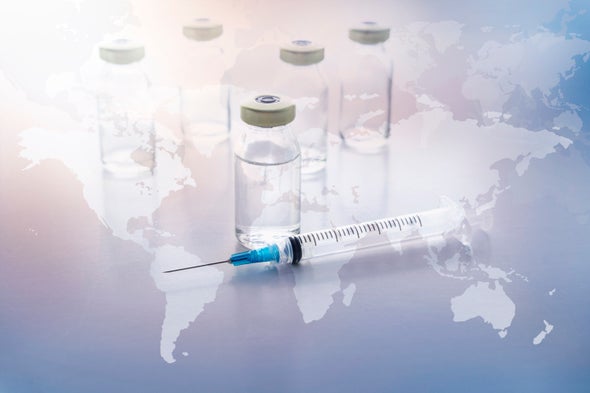https://www.scientificamerican.com/article/a-covid-vaccine-for-all/

While the Omicron variant spreads across the world and major producers of COVID vaccines squabble over granting global access, a vaccine developed by the Texas Children’s Hospital Center for Vaccine Development (Texas Children’s CVD) and Baylor College of Medicine is ready to be deployed. In the last week of 2021, India’s drug regulation agency authorized a vaccine producer in the country to begin distributing a COVID vaccine called CORBEVAX.
Two years into the pandemic, CORBEVAX is the first COVID vaccine designed specifically for global health. It is a milestone for global vaccine equity, something we believe will overcome vaccine hesitancy, and serves as a blueprint for how to develop a potent vaccine for pandemic use in the absence of substantial public funding.
The vaccine prototype was first developed by scientists at Texas Children’s CVD and Baylor before it was licensed, with no patents or strings attached, to Biological E. Limited (BioE).
The central government of India has already ordered 300 million doses. And BioE, the company manufacturing the vaccine, plans to produce 100 million or more doses per month starting in February. Approximately 150 million doses have already been produced and are ready to roll out. In addition to what the company is supplying to India, BioE plans to deliver more than one billion additional doses to other countries.
What this means is that CORBEVAX will soon vaccinate more people than vaccine doses donated so far by the U.S. government or any other G7 country.
This new COVID vaccine has several distinct features that make it particularly suitable for use in resource-poor settings: it is safe, effective and can be locally produced at very high quantities. CORBEVAX is easy to store and inexpensive. We hope it will be used in low- and middle-income countries in Africa, Asia and Latin America, where vaccine availability has generally been abysmal.
CORBEVAX is made using technology that has been employed worldwide for decades, meaning that manufacturing processes are generally already well-known and won’t require a steep learning curve like the one needed for the scale-up of new technologies such as mRNA, adenovirus and protein particle vaccines.
CORBEVAX is made through microbial fermentation in yeast, similar to the process used to produce the recombinant hepatitis B vaccine that many resource-poor countries make and employ. This will allow for local manufacturing of COVID vaccines similar to CORBEVAX. Texas Children’s CVD and Baylor have already licensed the COVID vaccine technology to companies in Indonesia and Bangladesh and have licensed it for production in African countries such as Botswana. Such vaccine technology and licensing agreements, together with co-development partners, represent the ideal example of how COVID vaccines can and should be produced locally and widely in countries in the Global South.
Like the recombinant hepatitis B vaccine that comes from the same technology, CORBEVAX has an excellent safety profile. In a phase 3 trial conducted in India, CORBEVAX produced mainly mild adverse events, making it perhaps one of the safest COVID-19 vaccines in use.
When compared with doses of the AstraZeneca–University of Oxford vaccine manufactured by the Serum Institute of India, CORBEVAX also produced a higher amount of neutralizing antibodies against the Delta and Beta variants of SARS-CoV-2, the virus that causes COVID (We expect to have Omicron data soon.) And it provided more durable and lasting protection. The vaccine neutralized variants of concern in laboratory animal studies and was highly protective in two nonhuman primate challenge trials. The trial results are being prepared for submission to a peer-reviewed journal.
As a recombinant protein vaccine developed from the receptor biding domain of the spike protein on the virus’s surface, combined with Dynavax Technologies’ CpG 1018 adjuvant with alum, the Texas Children’s CVD COVID vaccine can be stored using simple refrigeration. And like the hepatitis B vaccine, this COVID vaccine has one of the lowest costs of any available to date. No patents have been filed on the vaccine technology, and Texas Children’s CVD is assisting and co-developing the vaccine alongside BE and other vaccine producers in the Global South, which helps keep the cost low.
Hundreds of millions of people have already been vaccinated with the recombinant hepatitis B vaccine over multiple generations. We anticipate people will readily accept CORBEVAX and similar recombinant protein COVID vaccines, including for pediatric use. And clinical trials in children are also underway in India. Parents may even be more willing to accept CORBEVAX than vaccines made with a newer technology. If there was ever a COVID vaccine that might triumph over vaccine hesitancy and refusal, we believe this could be the one.
We now have a new beginning and a head start to finally vaccinate the world. Remarkably, Texas Children’s CVD did this with no major federal or G7 support, instead relying almost exclusively on private philanthropy based in Texas, New York and elsewhere.
Is it possible that, had we even had a fraction of the support afforded to the biotech or multinational companies producing new technology vaccines, the world might have been vaccinated by now? Possibly, we could have prevented the emergence of Omicron. Alpha and Delta likely arose from unvaccinated people. Therefore, we continue to ask the federal government and G7 nations for assistance in order to co-develop our recombinant protein vaccine with new partners in other low-resource countries. This includes safely advancing them to the COVAX sharing facility for global distribution.
During this next year, we hope to partner with the World Health Organization and other United Nations agencies to finally vaccinate the world. We believe that, with our low-cost yet highly effective, safe, and easy to store and distribute recombinant protein vaccine, we might finally achieve global vaccine equity and overcome vaccine hesitancy and refusal. This is a critical next step to vaccinate our way out of the COVID-19 pandemic.
No comments:
Post a Comment